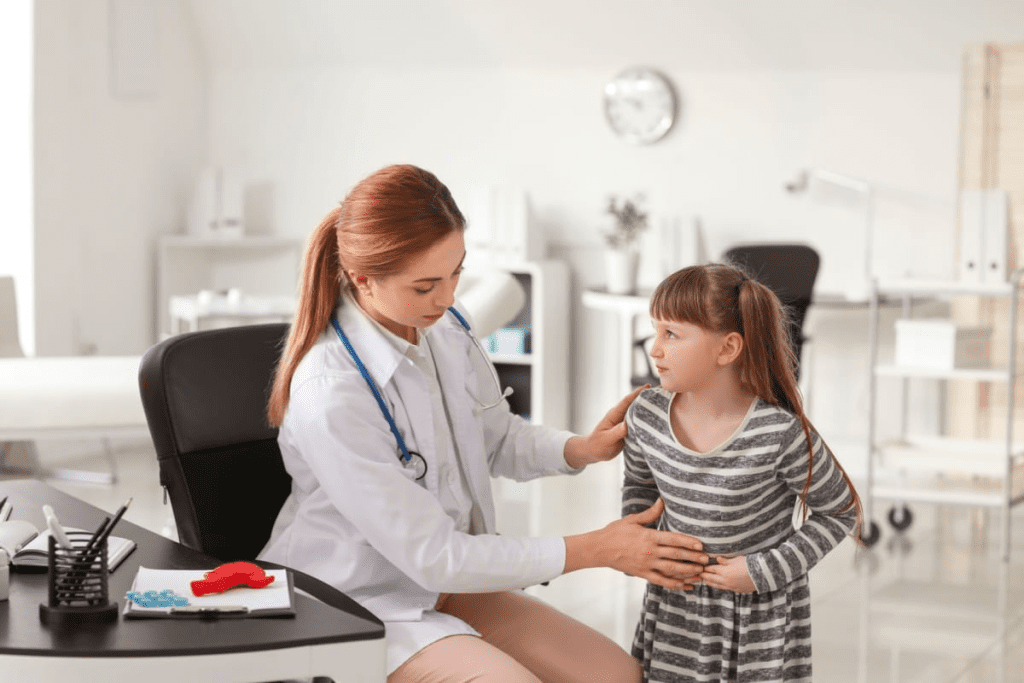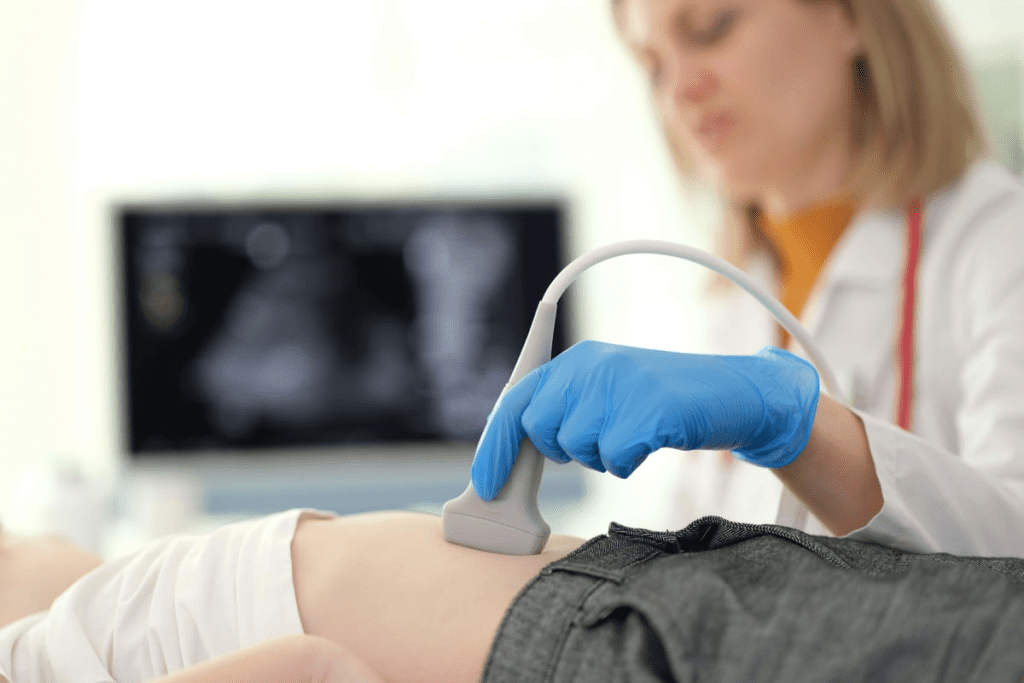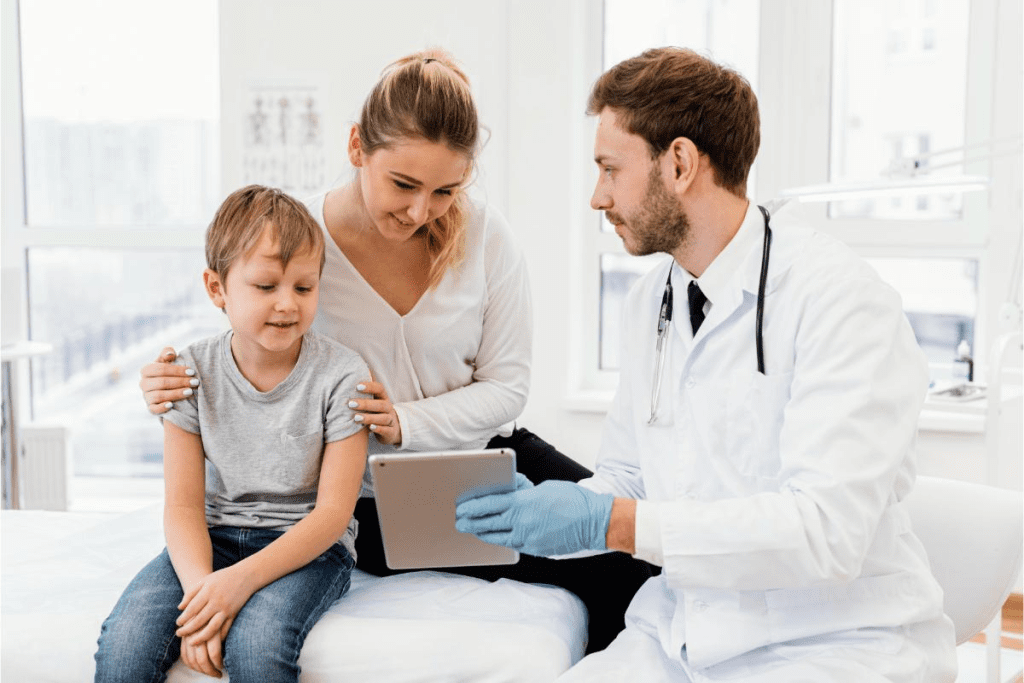Last Updated on November 14, 2025 by

At St. Luke’s Pediatric Gastroenterology, we focus on your child’s digestive health during their first visit. We know parents and kids can feel nervous. The MD says, “Parents and kids have a lot of anxiety about the unknown when they come see me.” We try to ease their worries by sharing information before the visit. So, what does a gastroenterologist do on first visit? The first appointment includes a detailed medical history and physical check-up. The gastroenterologist will ask about your child’s symptoms, dietary habits, and bowel movements. They might perform a physical exam, which could include abdominal observation and palpation. Depending on the case, tests like blood, urine, or stool samples may be taken. Imaging studies or special tests such as ultrasound or X-rays might be planned. Our team wants to make sure your child feels comfortable and to create a treatment plan tailored to their needs, helping your family stay on the path to wellness.

Pediatric gastroenterology is a special field of medicine for kids’ digestive health. It deals with the stomach, liver, and pancreas issues in young ones. Doctors in this field help diagnose and treat these problems.
A pediatric gastroenterologist is a doctor who specializes in kids’ digestive health. They handle everything from simple issues like constipation to complex ones like inflammatory bowel disease. They are experts in treating kids’ unique digestive needs.
Children’s digestive systems are different from adults’. Pediatric gastroenterologists know this and tailor their care to fit each child’s needs. This ensures kids get the best treatment for their health issues.
Adult and pediatric gastroenterologists face different challenges. Pediatric gastroenterologists focus on kids from birth to teens. They understand how kids’ digestive systems grow and change.
Pediatric gastroenterologists give care that fits each child’s age and size. They aim to manage symptoms, treat diseases, and prevent future problems. This approach helps kids get the care they need.

Knowing when your child needs to see a pediatric gastroenterologist is key. It can greatly affect their health. As a parent, you might worry about your child’s stomach issues.
Some signs mean it’s time to see a specialist. Look out for persistent abdominal pain, vomiting, diarrhea, failure to gain weight, and feeding problems. If your child shows any of these, talk to your doctor right away.
Your doctor is key in deciding if your child needs a specialist. If they think your child needs special care, they’ll send you to a pediatric gastroenterologist. This referral process helps make sure your child gets the right care.
It’s important to know when to rush to the doctor and when to wait. If your child has severe abdominal pain, bloody stools, or signs of dehydration, go to the emergency room. For milder symptoms, you can book a regular appointment with a pediatric gastroenterologist.
Understanding when to see a pediatric gastroenterologist is vital for your child’s health. By spotting warning signs and following the referral process, you can help your child get the care they need.
A well-prepared first visit to a pediatric gastroenterologist can greatly impact your child’s diagnosis and treatment. It’s important to be ready with the right information and documents.
When you first visit a pediatric gastroenterologist, bring all important medical records. This includes test results, medication lists, and letters from other doctors. Having these documents helps us understand your child’s health history and make the best decisions for their care.
Key documents to bring include:
It’s also important to document your child’s symptoms and diet history. Keeping a diary of symptoms and diet can be very helpful. Note when symptoms happen, what they are, and what might make them better or worse. Also, write down your child’s eating habits, including any foods that cause discomfort or allergic reactions.
Tips for documenting symptoms and diet history:
By being thorough in your preparation and bringing the necessary information, you can help us provide the best possible care for your child during their first visit.
The first visit with our pediatric gastroenterologist is all about understanding your child’s health. We make sure the process is smooth and comfortable for everyone. This helps us get a clear picture of your child’s health.
When you arrive, we start by checking your child’s vital signs. We also gather important medical information. This step helps us understand your child’s current health.
You and your child will meet our team during the visit. We aim to create a friendly atmosphere. This way, you can openly discuss your child’s health concerns.
The first visit covers a lot, including a medical history review and physical exam. We also talk about your child’s symptoms. The whole process is designed to be thorough but quick, lasting about 60 to 90 minutes.
We aim to make the first visit informative and stress-free. By the end, you’ll know what’s next for your child’s care. We’ll start working on a plan tailored to their needs.
We start by taking a detailed medical history to find out what might be causing your child’s stomach issues. This step is key to figuring out the real reasons behind their symptoms. It helps us create a treatment plan that works.
A thorough medical history covers your child’s past illnesses, surgeries, allergies, and current medicines. This info helps us spot possible triggers or underlying conditions that might be causing their stomach problems.
Looking at your family’s medical history is also important. Some stomach issues can run in families, so knowing your family’s health history is helpful.
Checking your child’s diet and nutrition is another key part of our assessment. We talk about their usual diet, eating habits, and any symptoms they have after eating.
By combining all this info, we get a full picture of your child’s stomach health. Then, we can make a treatment plan just for them.
We also track your child’s height, weight, and BMI to watch their growth and development. This info is a baseline for future checks. It helps us spot any growth or nutrition issues early.
At our first visit, our pediatric gastroenterologists do a detailed physical check-up. They look at your child’s health and find any gut problems. This step is key to figuring out and fixing gut issues in kids.
“A thorough physical examination is essential in understanding a child’s condition and developing an effective treatment plan,” says a renowned pediatric gastroenterologist. “We take the time to ensure that our young patients are comfortable throughout the process.”
Checking your child’s growth and development is a big part of the exam. We measure height, weight, and BMI to see if they’re growing right. This helps spot any nutrition or gut problems.
The belly check is a big part of the exam. Our experts use soft and careful methods to look for any oddities in the belly. This gives us important info about your child’s gut health.
We might do more checks if needed. These could include looking at nutrition, checking for dehydration, or finding other gut symptoms. We aim to get all the info we can to make a correct diagnosis and treatment plan.
By mixing what we find in the physical exam with other tests and your child’s health history, we get a full picture. Then, we can give the best care possible.
First, we take a detailed medical history and do a physical check-up. Then, we start the initial diagnostic testing to find out what’s causing your child’s stomach problems. These tests are key to figuring out what’s going on with your child.
We might do blood tests to see if there’s an infection, inflammation, or if your child is missing some nutrients. Tests like a complete blood count (CBC), liver function tests, and nutritional tests are common.
We also suggest non-invasive imaging to see inside the body. This includes X-rays to spot blockages or odd shapes and an ultrasound to look at the organs in the belly.
Our team uses these tests to get all the info we need. This helps us make a good plan to treat your child. The tests we choose depend on your child’s symptoms and what we find first.
By combining the test results with what we learned from the history and physical, we can pinpoint and treat your child’s stomach issues accurately.
At our first meeting, we focus on talking about your child’s symptoms. We know it can be hard to talk about these issues. But it’s a key part of figuring out what’s wrong.
We’re here to listen and help. We want you to feel at ease when sharing about your child’s health.
Many kids come to see us because of stomach pain. We ask lots of questions about the pain. This includes where it hurts, how bad it is, and what makes it better or worse.
It helps if you can tell us more about your child’s pain. Like when it started, how often it happens, and what might make it better. This info helps us figure out what’s going on and how to help.
Changes in bowel movements or trouble with digestion are common reasons for a visit. We talk about your child’s diet and check their digestive health. This helps us find the cause of their symptoms.
We also look at other signs like bloating, gas, or not wanting to eat. By looking at all these things, we get a clearer picture of what’s going on. Then, we can make a plan to help your child.
We want to work with you to understand your child’s symptoms. By talking openly, we can make sure they get the best care.
After getting a diagnosis, we create a treatment plan just for your child. We work with you to make a plan that might need quick fixes or long-term care. This plan could be a mix of both.
Depending on the diagnosis, we might suggest quick fixes to help your child feel better. These could be changes in diet, medicine, or other treatments. For long-term care, we plan regular check-ups, lifestyle changes, and possibly ongoing medicine.
“A good treatment plan meets the child’s specific needs,” says a top pediatric gastroenterologist. “We make sure families understand and agree with the plan.”
Choosing medicine for your child is a careful process. We talk about the medicine’s benefits and risks. We explain how it works, possible side effects, and how we’ll keep an eye on it.
Follow-up visits are key to the treatment. They might include more tests, check-ups, or monitoring to see how your child is doing. We adjust the plan as needed.
You might get homework, like keeping a food diary or trying different diets. We’ll tell you what to do and how to get ready for these steps.
Working together and talking openly helps your child get the best care. Our aim is to help your child manage their GI issues and live a better life.
We bring together experts from different fields to create a care plan that fits each child’s needs. Our team focuses on multidisciplinary care for GI issues. We look at the medical, nutritional, and psychological aspects of a child’s health.
Depending on your child’s diagnosis, we might connect you with a specialized program. This ensures your child gets the right treatment for their GI disorder.
We collaborate with nutritionists who are experts in pediatric GI health. They help create a diet plan that supports your child’s health and manages their GI condition.
Our team also offers psychological support services. We know GI disorders can be tough, both physically and emotionally. Our services aim to help your child manage stress and anxiety related to their condition.
We also value coordination with primary care. We keep your primary care physician updated on your child’s treatment and progress. This teamwork ensures your child gets the best care possible.
Our commitment to a multidisciplinary approach shows our dedication to top-notch healthcare. We aim to address all aspects of a child’s well-being.
When your child gets a diagnosis of a gastrointestinal issue, it’s key to understand it well. We aim to educate you and your family about your child’s condition. We want to show you the best ways to manage it.
Getting a diagnosis can feel overwhelming. But knowing the details of your child’s condition is vital. Our team will explain it all to you, making sure you get it.
Key aspects to understand about your child’s GI diagnosis include:
Diet is very important in managing GI issues. We’ll guide you on how to adjust your child’s diet. This might include what foods to choose, how often to eat, and other nutrition tips.
Some common dietary strategies for GI management include:
Dealing with a GI condition is tough, not just for the child but for the whole family. We offer support groups and community resources. They help you connect with others facing similar challenges.
These resources offer emotional support, practical tips, and a sense of community. We can help you find local and online groups. We also have other community resources that can greatly help your journey.
After your child’s first visit to a pediatric gastroenterologist, we will have a clearer understanding of their condition. We will also have a plan in place to address their needs. You can expect to receive guidance on follow-up care.
This care may include additional testing, treatment adjustments, or lifestyle changes. We often use special formulas for babies or toddlers who need them. For older kids with intestinal issues, we recommend dietary changes.
Our goal is to provide the support and care your child needs to thrive. We will work closely with you to ensure that you are equipped to manage your child’s condition effectively.
Understanding what to expect after a GI appointment is key to your child’s ongoing care. We will outline a follow-up plan. This plan may include further diagnostic testing or treatment modifications.
Our team is committed to being with you every step of the way. We provide follow-up care for GI issues. We ensure your child receives the best possible outcomes.
Pediatric gastroenterology is a special field of medicine. It deals with the stomach and intestines of babies, kids, and teens. It helps find and treat problems in these areas.
If your child has ongoing or serious symptoms like belly pain, throwing up, or changes in bowel movements, see a pediatric gastroenterologist.
At the first visit, you and your child will meet the doctor and team. They will check your child’s vital signs and get important medical info. You’ll talk about your child’s symptoms and any worries you have.
Bring all medical records, test results, and medication lists. Keeping a symptom diary can also help a lot.
Tests like blood work or imaging studies might be ordered. These help check for infections, inflammation, or nutritional issues.
After tests, we’ll create a treatment plan for your child. It might include immediate actions or long-term strategies.
We offer support from nutritionists, psychologists, and primary care doctors. We also provide education and resources to help manage your child’s condition.
After the first visit, we’ll know more about your child’s condition and have a plan. You’ll get guidance on follow-up care, which might include more tests or lifestyle changes.
The first visit can take a while. It includes a full medical history, physical exam, and discussions about symptoms and concerns.
Usually not. The first visit focuses on gathering information and assessing your child’s condition. Procedures or tests will be discussed and scheduled as needed.
Subscribe to our e-newsletter to stay informed about the latest innovations in the world of health and exclusive offers!